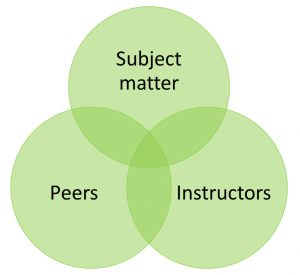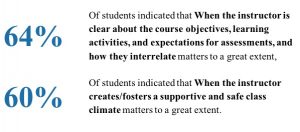Two graduate students from the Occupational Therapy program analyzed the findings from the nine fall-term instructor interviews: Here’s what they found:
Author: lanek
Preliminary Student Focus Group Findings
Connections Matter
Students who participated in the three fall-term focus groups indicated that their wellbeing is supported when they feel connected to the subject matter, the instructor and their peers.

Students seem to feel a sense of connection with the subject matter when they see the relevance of the course topics to their studies or future career plans. Some students indicated that having applied learning opportunities, either through practical assignments with classmates or through community-engaged projects, increase their interest in learning:
“It was about community building and actually having a project outside of the university, building it and designing it yourself. Feeling proud to actually showcase something that was my work” (Student 8, Arts).
Presenting the material in an engaging manner also seems to increase student interest in the course. Students were generally in favour of active learning methods, such as in-class worksheets and discussions. Besides, instructors can also spark student engagement by showing their passion and excitement for the course, and using humour or sharing anecdotes when appropriate.
In addition to increasing students’ engagement with the material, these practices also seem to foster a more personal connection with the instructor. Feeling connected to the instructor seems to increase students’ motivation to attend class and reduces the barriers for seeking extra help when required. In addition to using interactive teaching practices, instructors can foster this sort of connection by learning (or attempting to learn) student names
“Profs that tries to remember a student’s name even though if they don’t get it right, you see them get, uh, make an effort to connect with the students and it makes you wanna…you know, be friends with him and that helps with the learning and also the mental wellbeing” (Student 1, Science).
Students also benefit from feeling a sense of connection with their peers. Having friends among their classmates helps students keep up with the course material and overcome both academic and personal challenges. One science student noted that “if you have the support network, you can really weather whatever storm may come your way” (Student 2). Instructors can help foster connections between peers by incorporating icebreaker and other interactive activities into the classroom. Fostering a safe classroom environment seems to make these activities more effective:
“I’ve had really positive experiences in big classrooms like a hundred plus people where I do make friends and that’s because the professor is incredibly talented at creating this supportive kind of empathy promotion environment where they do a lot of icebreakers and they do a lot…this kind of let’s talk about our experience foundational like aspect to what you are studying.” (Student 7, Arts)
A first look at how teaching practices affect student wellbeing (part 2)

(Photo credit: UBC Public Affairs)
Yesterday we shared qualitative findings from the 2015 Undergraduate Experiences Survey (UES). Aside from the 10 teaching practices that we recognized as being influential in promoting student mental health and wellbeing, we also asked for students’ input on identifying other teaching practices that had positive impacts on their wellbeing. Almost 2000 students mentioned additional teaching practices that contributed to their wellbeing. Their comments were grouped into the three main categories described below.
1) Engagement in the learning process promotes student wellbeing
- Provide engaging and interactive classroom experience that includes things such as in-class activities and discussions.
- Include opportunities for students to practice the course content outside of classroom. For example, the opportunity to attend a course-related event.
- Hands-on, applied and practical learning helps with knowledge retention
- Subject matters that are relevant and relatable promote student interest and learning.
2) Wellbeing is supported when students understand how to succeed in a class and feel supported to do so
- Students feel that their wellbeing is supported when they know how to succeed in a course
- Well-structured classes and when instructors provide clear examples and explanations for course topics.
- More frequent, smaller assessments help them stay on top of the material and provide multiple opportunities for feedback
- Timely and constructive feedback support student wellbeing by supporting learning and by demonstrating that the instructor cares about their learning and success.
- Flexibility in the grading scheme (i.e. dropping the lowest mark, offering a mark-up assignment) support student wellbeing by enabling students to recover from a poor assessment.
3) Establishing a relationship with the instructor promotes wellbeing
- Students indicated that having a personal connection with their instructor supports their wellbeing, instructors can foster this by learning student names and by having short informal conversations with their students.
- Being friendly and approachable. This also makes the student more likely to approach the instructor for help when necessary.
- Fostering a positive classroom climate where students feel safe and welcome
- Demonstrate care for a students’ holistic wellbeing
The take home message here is that students feel that their wellbeing is supported when the instructors actively engage them in classes, provide clear learning objectives, and when instructors make an effort to establish relationships with their students. Have you engaged in any of the above practices during your teaching career? What are some barriers to applying the above instructional practices? Please feel free to comment below. We would love to hear your thoughts and/or ideas!
A first look at how teaching practices affect student wellbeing (part 1)

(Photo credit: UBC Public Affairs)
Our quest to discover if teaching practices are instrumental in promoting student wellbeing began with the 2015 Undergraduate Experiences Survey (UES). Our first glimpse at the data suggests that YES! an instructor’s choice of teaching practices does indeed affect student wellbeing.
Students were asked to indicate to what extent each of 10 teaching practices had a positive impact on their wellbeing. Among the 5590 students who responded, the two teaching practices that had the greatest positive impact were:

The full results can be downloaded here. Qualitative input from the students will be shared in part 2.
Now that we have a better idea of the kinds of teaching practices that contribute to student learning and wellbeing, we would love to hear your thoughts and/or ideas! Please feel free to comment below and share with us some of the practices that you find effective in promoting student mental wellbeing!
UBC First Year Experience Science Education Symposium
On September 24th, our team will be presenting our findings and discussing teaching practice and student mental wellbeing with faculty and instructors in the Faculty of Science at the UBC First Year Experience Science Education Symposium. Come join us to learn about some of these simple but practical methods that you can try out in the coming term!
Learn more and register here: https://science.ubc.ca/faculty/fyx
TLEF Showcase
We embedded knowledge translation opportunities throughout year 1 of the Teaching Practices and Student Wellbeing project. On May 5th, 2016, we presented a poster at the TLEF showcase as part of UBC’s Celebrate Learning Week!